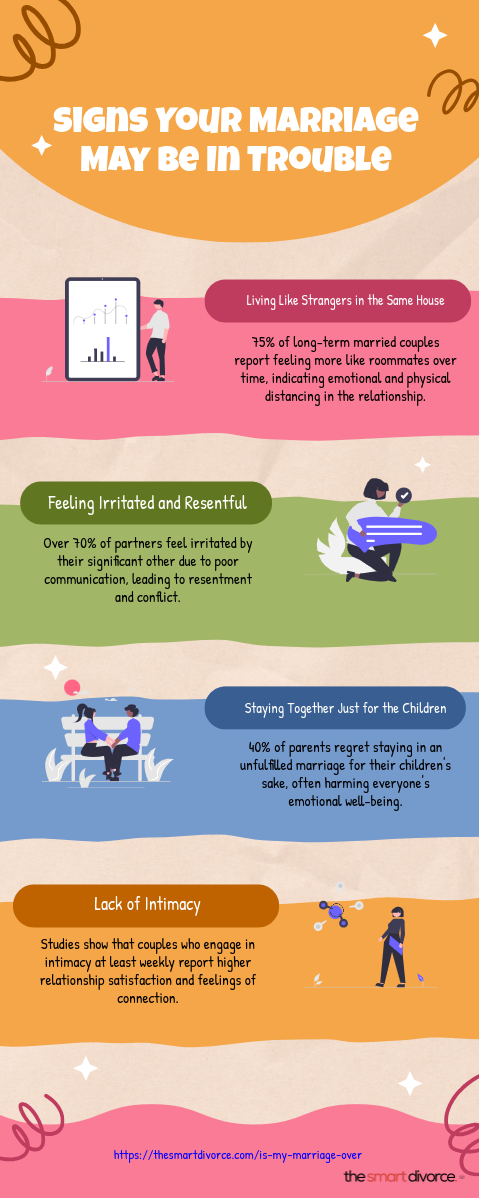In today’s fast-paced world, many ask, “Is my marriage over?” This question often brings mixed emotions—confusion, sadness, fear, and uncertainty. If you’re wondering if your relationship has reached its breaking point, this post will provide clarity, insight, and guidance.
How to Tell If Your Marriage Is Over
Recognizing marriage separation indicators is the first step in deciding what to do next. Every couple goes through tough times, but several common red flags—recognized as signs of marriage trouble—such as constant arguments over trivial matters, a lack of interest in each other’s lives, or a feeling of relief when your partner is not around, suggest it might be time to consider separation or divorce.
Living Like Strangers in the Same House
When partners feel more like roommates than couples, it clearly shows something is wrong and may require exploring the process of separation. If you and your spouse are merely coexisting without emotional or physical intimacy, shared activities, or meaningful conversations, your marriage may feel beyond repair.
Feeling Irritated and Resentful
Do you often feel irritable when your partner is around or when they speak? This constant irritation usually leads to resentment and indicates unresolved issues. Such negativity prevents positive interactions and weakens your relationship over time.
Staying Together Just for the Children
Many couples stay married for the sake of their children, delaying the stages of divorce, but this decision can sometimes do more harm than good. However, this decision can sometimes do more harm than good. If the only reason you’re together is because of the kids, it might be time to ask yourself if this unhappy marriage truly benefits everyone.
Lack of Intimacy
Physical intimacy is a critical component of a healthy marriage. If there’s a lack of intimacy—like affection, touching, or sexual relations—it may mean the emotional bond between you and your spouse has weakened. This can be one of the signs that your marriage is no longer worth saving.
Constant Fighting and No Resolution
Constant arguments with no resolution can be exhausting and harmful. If friends, family, and even in-laws are tired of the continuous conflict, it may indicate the relationship is in turmoil beyond repair.
Emotional Distance and the “Disappearing Spouse”
It’s a red flag when one spouse starts spending significantly less time together at home or avoids family activities. This could include missing date nights, skipping children’s events, or avoiding family dinners. Emotional distancing often suggests a desire to escape the realities of a troubled marriage.
How Do You Know When Your Marriage Is Over?
When facing marital difficulties, it’s easy to fall into misconceptions that can cloud judgment and prevent you from making informed decisions. Here are some common misconceptions to be aware of:
- “Every problem in a marriage is irreparable.”
- Not all problems mean a marriage is over. Many issues can be resolved with effort, communication, and professional help like marriage counselling. With the proper support, couples may find they can overcome even significant challenges.
- “Divorce is always the fault of one partner.”
- Marriage breakdowns usually result from multiple factors, including personal growth, life changes, and external pressures. Blaming one partner prevents productive conversation and healing.
- “Love alone can sustain a marriage.”
- While love is essential, a lasting marriage requires mutual respect, trust, effective communication, and effort. Love is just one component of a successful marriage.
The Importance of Communication in Marital Crises
Effective communication is vital in any relationship, especially during times of crisis. It allows partners to express concerns, fears, and needs and understand each other’s perspectives. This can be achieved by setting aside regular time for open and honest conversations, actively listening to each other without interrupting, and practicing empathy to understand and validate your partner’s feelings.
- Create a Safe Space for Open Dialogue:
- When facing the possibility that your marriage is over, it’s crucial to have honest conversations in a supportive environment. Both partners should feel safe expressing their emotions without fear of criticism. This is particularly important when dealing with sensitive issues like mental health or financial concerns.
- Practice Active Listening and Empathy:
- Listen without interrupting and validate your partner’s feelings. Empathy helps build a bridge between partners, fostering understanding and compassion.
How Do You Know If Marriage Is Over? When to Seek Professional Help
Deciding to seek professional help is a significant step in assessing the state of your marriage. A marriage counsellor or Divorce Coach can offer a neutral space for you and your partner to explore your thoughts and feelings, empowering you to take control of your relationship’s future.
- When to Seek Help:
- Consider professional intervention if your efforts to resolve conflicts or reconnect emotionally haven’t worked. A coach or therapist can offer new perspectives and strategies for overcoming barriers.
- Why Seek Professional Help:
- Seeking professional help doesn’t always mean saving the marriage; it’s about finding clarity on the best path forward, whether rebuilding the relationship or deciding to part ways amicably.
Signs to End a Marriage: Evaluating Emotional Distance Between Partners
Emotional distance can be a clear indicator that a marriage is over. When the emotional bond weakens, maintaining a healthy relationship becomes complicated. Signs of emotional distance can include a lack of interest in each other’s lives, a feeling of loneliness even when together, or a lack of emotional support during difficult times. Reflecting on the emotional connection in your marriage and these signs can help you decide if it’s worth trying to bridge the gap.
- Understanding the Root Cause:
- Emotional distance may stem from unresolved conflicts, unmet needs, mental health issues, or external pressures. Open discussions with your partner about these issues can provide insight into whether there is a path back to each other.
- Professional Guidance Can Help:
- Sometimes, emotional distance is due to complex emotional wounds requiring professional help. A therapist or counsellor can provide tools to help rebuild emotional intimacy and trust.
How to Know When Marriage Is Over: The Role of Trust in a Healthy Marriage
Trust is essential in any strong relationship. Without it, a marriage can exhibit indicators of marital split and eventually break. Assessing your confidence level in your marriage can help you decide whether to rebuild or move on.
- Rebuilding Trust:
- Trust can be rebuilt through open communication, consistency, and setting clear boundaries, and marriage counseling can support this healing process. It’s a slow process that requires patience and effort from both partners.
- Professional Support for Rebuilding Trust:
- A marriage counsellor can help facilitate discussions to help partners understand each other’s fears and needs, laying a foundation for rebuilding trust.
Signs Marriage Is Over Navigating the Decision to Separate
Deciding to separate is a deeply personal and often difficult decision. It’s essential to weigh all options and seek professional advice to understand the long-term implications.
- Discuss Expectations and Plans:
- Have clear discussions about the division of assets, responsibilities, and, if applicable, co-parenting arrangements to ease the divorce process.
- Seek Emotional Support:
- To navigate this emotionally challenging time, lean on friends, family, or seek guidance through relationship therapy. Prioritizing self-care and setting healthy boundaries is crucial for personal wellbeing.
How to Know If My Marriage Is Over Rebuilding or Letting Go
As you consider your marriage’s future, consider what you truly want and what is best for your well-being.
- Assess Your Situation:
- Consider whether attempts to rebuild the relationship have been effective. If both partners feel there is no way forward, it might be healthier to let go.
- Seek Guidance:
- Talking to trusted friends, family, or a professional can provide valuable perspectives and help you make an informed decision.
Moving Forward: Life After Marriage
Whether you decide to rebuild or let go, life after marriage brings new challenges and opportunities for growth. It’s essential to take the time to heal and rediscover yourself.
- Rediscover Your Identity:
- Take time to explore personal interests and set new goals. This period is an opportunity to focus on self-care and personal growth.
- Build a Support Network:
- Surround yourself with supportive friends and family, or seek professional guidance to help navigate this transition.
Final Thoughts
Facing the question, “Is my marriage over?” requires courage, honesty, and empathy. By recognizing the signs, understanding misconceptions, and focusing on communication and trust, you can make an informed decision about your marriage’s future. Whether you rebuild or move on, remember that your wellbeing and personal growth matter most.
At The Smart Divorce
If you’re struggling with the question, “Is my marriage over?” and need guidance on your next steps, The Smart Divorce is here to support you. Our Divorce Coaches, Sarah Bates, a Certified Divorce Specialist, and Ken S. Maynard, a Certified Divorce Financial Analyst, offer personalized coaching services via telephone and Zoom video calls. We understand the complexities of this journey and are committed to helping you navigate your path with clarity and confidence.
Schedule a Free 15-minute Get Acquainted Call here to explore how we can help you make informed decisions about your future.


